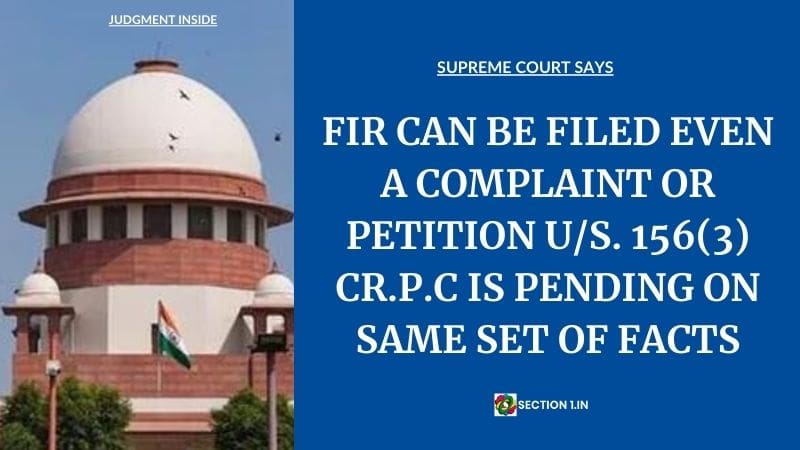5. We have heard the learned counsel for the respective parties at length. It is the case on behalf of the appellants that as on the same allegations, the private respondent-complainant has filed an application under Section 156(3) Cr.P.C., which is pending before the learned Magistrate, the impugned FIR with the same allegations and averments would not be maintainable, and therefore, the FIR lodged with the police station Loni Border, District Ghaziabad deserves to be quashed and set aside. The aforesaid cannot be accepted for the simple reason that Code of Criminal Procedure permits such an eventuality of a complaint case and enquiry or trial by the Magistrate in a complaint case and an investigation by the police pursuant to the FIR. At this stage, Section 210 Cr.P.C. is required to be referred to, which reads as under:
“210. Procedure to be followed when there is a complaint case and police investigation in respect of the same offence – (1) When in a case instituted otherwise than on a police report (hereinafter referred to as a complaint case), it is made to appear to the Magistrate, during the course of the inquiry or trial held by him, that an investigation by the police is in progress in relation to the offence which is the subject- matter of the inquiry or trial held by him, the Magistrate shall stay the proceedings of such inquiry or trial and call for a report on the matter from the police officer conducting the investigation.
(2) If a report is made by the investigating police officer under section 173 and on such report cognizance of any offence is taken by the Magistrate against any person who is an accused in the complaint case, the Magistrate shall inquire into or try together the complaint case and the case arising out of the police report as if both the cases were instituted on a police report.
(3) If the police report does not relate to any accused in the complaint case or if the Magistrate does not take cognizance of any offence on the police report, he shall proceed with the inquiry or trial, which was stayed by him, in accordance with the provisions of this Code.”
Thus, as per Section 210 Cr.P.C., when in a case instituted otherwise than on a police report, i.e., in a complaint case, during the course of the inquiry or trial held by the Magistrate, it appears to the Magistrate that an investigation by the police is in progress in relation to the offence which is the subject matter of the inquiry or trial held by him, the Magistrate shall stay the proceedings of such inquiry or trial and call for a report on the matter from the police officer conducting the investigation. It also provides that if a report is made by the investigating police officer under Section 173 Cr.P.C. and on such report cognizance of any offence is taken by the Magistrate against any person who is an accused in the complaint case, the Magistrate shall inquire into or try together the complaint case and the case arising out of the police report as if both the cases were instituted on a police report. It also further provides that if the police report does not relate to any accused in the complaint case or if the Magistrate does not take cognizance of any offence on the police report, he shall proceed with the inquiry or trial, which was stayed by him, in accordance with the provisions of Cr.P.C.
Thus, merely because on the same set of facts with the same allegations and averments earlier the complaint is filed, there is no bar to lodge the FIR with the police station with the same allegations and averments.
6. However, at the same time, if it is found that the subsequent FIR is an abuse of process of law and/or the same has been lodged only to harass the accused, the same can be quashed in exercise of powers under Article 226 of the Constitution or in exercise of powers under Section 482 Cr.P.C. In that case, the complaint case will proceed further in accordance with the provisions of the Cr.P.C.
PARTY: Kapil Agarwal and others vs. Sanjay Sharma and others – CRIMINAL APPEAL NO. 142 OF 2021 – March 01, 2021.
https://main.sci.gov.in/supremecourt/2017/31448/31448_2017_36_1502_26554_Judgement_01-Mar-2021.pdf



